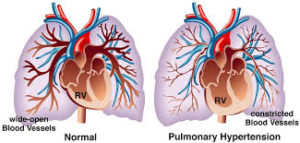Here’s my list of recommended Broadway, off-Broadway, and out-of-town shows, updated weekly. In all cases, I gave these shows favorable reviews (if sometimes qualifiedly so) in The Wall Street Journal when they opened. For more information, click on the title.
BROADWAY:
• Dear Evan Hansen (musical, PG-13, all shows sold out last week, reviewed here)
• Hamilton (musical, PG-13, Broadway transfer of off-Broadway production, all shows sold out last week, reviewed here)
 OFF BROADWAY:
OFF BROADWAY:
• The Portuguese Kid (comedy, PG-13, closes Dec. 3, reviewed here)
CLOSING SOON OFF BROADWAY:
• The Home Place (drama, PG-13, closes Nov. 19, reviewed here)
CLOSING NEXT WEEK IN MADISON, N.J.:
• Shakespeare in Love (historical romcom, PG-13, closes Nov. 12, reviewed here)


 A couple of years before we first met, Mrs. T was diagnosed with pulmonary hypertension, a chronic illness about which I had occasion to
A couple of years before we first met, Mrs. T was diagnosed with pulmonary hypertension, a chronic illness about which I had occasion to  We are, needless to say, as grateful as it’s possible to be to the doctors who’ve kept Mrs. T alive this long. They were betting against the house. When we met, late in 2005, her life expectancy was two years. I found that out by
We are, needless to say, as grateful as it’s possible to be to the doctors who’ve kept Mrs. T alive this long. They were betting against the house. When we met, late in 2005, her life expectancy was two years. I found that out by  It’s been evident to both of us for the past year or so that Mrs. T would soon reach the point where there was no longer any alternative to a transplant. The catch is that there simply aren’t enough donor lungs to go around in the New York transplant region. To donate the organs of a loved one is the greatest gift you can give, but one that not nearly enough people do give. Every fifteen hours, someone in New York dies while waiting for a donor organ.
It’s been evident to both of us for the past year or so that Mrs. T would soon reach the point where there was no longer any alternative to a transplant. The catch is that there simply aren’t enough donor lungs to go around in the New York transplant region. To donate the organs of a loved one is the greatest gift you can give, but one that not nearly enough people do give. Every fifteen hours, someone in New York dies while waiting for a donor organ. For this reason,
For this reason,  Both of us will soon be keeping our cellphones charged and on at all times, since there’s no telling when the call might come. It might be next Saturday at three in the morning, or six months from now. That’s the way it goes with transplants: you never know until the phone rings, though we’ve been told that you do tend more often than not to get called in the middle of the night.
Both of us will soon be keeping our cellphones charged and on at all times, since there’s no telling when the call might come. It might be next Saturday at three in the morning, or six months from now. That’s the way it goes with transplants: you never know until the phone rings, though we’ve been told that you do tend more often than not to get called in the middle of the night. I hasten to add that the caregiving in our little family unit of two has never been a one-way affair! Mrs. T has given me at least as much pleasure and inspiration as I’ve tried to give her. I have no idea where she finds the strength to cope with the day-to-day demands of the illness that has slowly gnawed away her physical vitality, or how she manages to keep her spirits so improbably high, even on the increasingly frequent days of total exhaustion that those who suffer from PH refer to as “couch days.” Alas, she’s needed a steadily increasing amount of care in recent years, and will need still more in the weeks and months to come, not just from me but from our family and friends. We have no doubt that they will rise to the occasion, just as I’ve tried to do so to the very best of my ability.
I hasten to add that the caregiving in our little family unit of two has never been a one-way affair! Mrs. T has given me at least as much pleasure and inspiration as I’ve tried to give her. I have no idea where she finds the strength to cope with the day-to-day demands of the illness that has slowly gnawed away her physical vitality, or how she manages to keep her spirits so improbably high, even on the increasingly frequent days of total exhaustion that those who suffer from PH refer to as “couch days.” Alas, she’s needed a steadily increasing amount of care in recent years, and will need still more in the weeks and months to come, not just from me but from our family and friends. We have no doubt that they will rise to the occasion, just as I’ve tried to do so to the very best of my ability. We both know what we’re getting into. Anyone who’s been in a transplant program is left in no doubt about what is to come. Mrs. T’s post-transplant life will be upended in countless ways both large (she’ll be under close medical supervision for the rest of her life) and small (no more raw oysters ever again!). We know, too, that no transplant—to put it very, very mildly—is a sure thing. But if we get lucky and do just what we’re supposed to do, she’ll also be able to turn off her oxygen concentrator for good and give it to someone who can’t afford one.
We both know what we’re getting into. Anyone who’s been in a transplant program is left in no doubt about what is to come. Mrs. T’s post-transplant life will be upended in countless ways both large (she’ll be under close medical supervision for the rest of her life) and small (no more raw oysters ever again!). We know, too, that no transplant—to put it very, very mildly—is a sure thing. But if we get lucky and do just what we’re supposed to do, she’ll also be able to turn off her oxygen concentrator for good and give it to someone who can’t afford one. All this came to mind when a copy of “The Encore: A Memoir in Three Acts,” a newly published memoir by Charity Tillemann-Dick, turned up in my mailbox the other day. Ms. Tillemann-Dick is a coloratura soprano who has continued to perform after undergoing two double lung transplants, an achievement that is unique in the history of singing. I vaguely recalled having read about her horrific experiences, but knew nothing of the details. Now I know all about them, and I find myself in awe of her, not just because of her indomitable determination but because it turns out that in addition to being an excellent singer, Ms. Tillemann-Dick is also a very fine writer. “The Encore” is one of the best books I’ve ever read about the effects of chronic illness on the human spirit. Most of us, I suspect, like to think that we’d rise to a difficult occasion if forced to do so, but rarely are we put to the test. Ms. Tillemann-Dick was, and she faced it with a courage that I can scarcely begin to fathom….
All this came to mind when a copy of “The Encore: A Memoir in Three Acts,” a newly published memoir by Charity Tillemann-Dick, turned up in my mailbox the other day. Ms. Tillemann-Dick is a coloratura soprano who has continued to perform after undergoing two double lung transplants, an achievement that is unique in the history of singing. I vaguely recalled having read about her horrific experiences, but knew nothing of the details. Now I know all about them, and I find myself in awe of her, not just because of her indomitable determination but because it turns out that in addition to being an excellent singer, Ms. Tillemann-Dick is also a very fine writer. “The Encore” is one of the best books I’ve ever read about the effects of chronic illness on the human spirit. Most of us, I suspect, like to think that we’d rise to a difficult occasion if forced to do so, but rarely are we put to the test. Ms. Tillemann-Dick was, and she faced it with a courage that I can scarcely begin to fathom….
